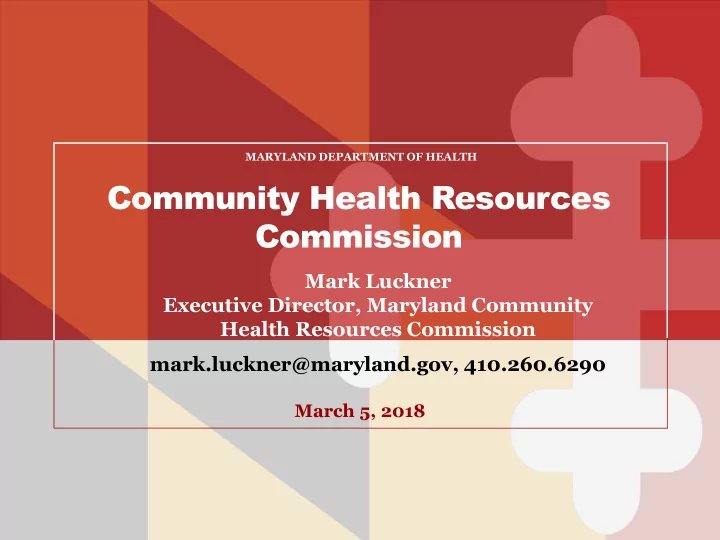

MARYLAND DEPARTMENT OF HEALTH Community Health Resources Commission Mark Luckner Executive Director, Maryland Community Health Resources Commission mark.luckner@maryland.gov, 410.260.6290 March 5, 2018
CHRC Behavioral Health Grants • Awarded 48 grants totaling $12.7 million. • Provided services to more than 68,000 Marylanders. • Grants have expanded access to mental health and substance use treatment services and integrated the delivery of these services in primary care settings. 2
CHRC Behavioral Health Grants Types of grants: • Integrated behavioral health services in primary care settings; • Medication-assisted therapy; • Re-entry programs; • Mobile crisis intervention teams; • Use of SBIRT in community settings; and • ED diversion programs 3
CHRC Behavioral Health White Papers CHRC partnered with Kimá Joy Taylor MD, MPH, to issue white papers that describe the impact of CHRC behavioral health grants on vulnerable populations. 1. Building a Base for Integrated Care, June 2017 2. Inclusion of Medications in SUD Care: Paving the Way to Uncover Opportunities and Challenges, August 2017 3. Re-entry Programs: The Intersection of Behavioral Health and Criminal Justice – coming later this year 4
Lessons Learned – White Papers CHRC grants have: • Supported clinical time and development of infrastructure for behavioral and somatic health care providers • Promoted new partnerships with criminal justice system • Supported behavioral health providers as they transition to new payment systems • Provided seed funding for innovative processes and programs that could be replicated statewide 5
Lessons Learned – White Papers CHRC grants have: • Provided technical assistance to organizations interested in implementing similar programs • Provided time and planning necessary to leadership to change the clinical culture of their organization • Supported critical up-front costs until providers could establish reimbursement mechanisms • Supported time needed to educate partners about the importance of medications within the SUD system of care 6
Overall Impact of Grants – White Papers • Increased number of patients receiving integrated community-based behavioral health and somatic care • Increased capacity to provide patient-centered care • Improved IT interactions and infrastructure • Incorporated evidence-based practices • Increased ability to leverage other funding streams 7
Overall Impact of Grants – White Papers • Increased access to and awareness of Medication- assisted Treatment across the state • Provided resources for medications until providers could establish a system of reimbursement • Demonstrated different ways to provide services depending on capacity and patient population 8
Overall Impact of Grants – White Papers • Provided funding to support partnerships between corrections and community stakeholders • Increased capacity of behavioral health providers to understand needs of criminal justice-involved populations • Provided seed funding for innovative processes and programs that can decrease the number of, and increase support for, criminal justice-involved populations in ways that could be scaled and replicated statewide 9
Examples of CHRC Behavioral Health Grants Intensive case management “ CareWrap ” program that focused on individuals with behavioral health needs who present at the Peninsula Regional Medical Center (PRMC) ED in high volumes. Over 15 months, achieved overall cost savings of $927,560 ($105,000 grant supported clinical staff). Behavioral health home project (adults with SMI) that integrates primary care with behavioral health services. Leveraged $1 million in private funding. Laid the groundwork for the State’s Medicaid Behavioral Health Home Initiative, launched in 2013. There are now 81 Health Homes in Maryland. ($170,000 grant supported operational and administrative costs). 10
Examples of CHRC Behavioral Health Grants “Project Phoenix” provides SUD treatment services, including medications, and addresses social determinants of health. Served 517 individuals and saw average number of ED visits drop 60%, from 1.57 to 0.63 visits per participant. Calvert Memorial Hospital will provide financial support to continue the program due to reduction in avoidable hospital costs. ($600,000 grant supported program staff and an upgraded EMR). A stabilization center and participant in the Safe Stations, serves individuals who are identified to be in crisis by EMS or law enforcement personnel. Patients are taken to the center instead of a hospital or jail and linked to a full range of behavioral health services including outpatient treatment, medications and residential services. ($225,000 grant supported clinical staff). 11
Examples of CHRC Behavioral Health Grants Re-entry program that addresses the social determinants of health impacting formerly incarcerated individuals. Develops concrete measurable outcomes to track/demonstrate the performance of re-entry programs at the local level. ($550,000 grant supported staff salaries and social service supports) Re-entry program that included substance abuse and mental health treatment for adjudicated individuals. Provided drug treatment, counseling, medical and mental health care to those incarcerated at the Harford County Detention Center and continued those services after release. ($484,237 grant supported staff salaries). 12
Recommend
More recommend